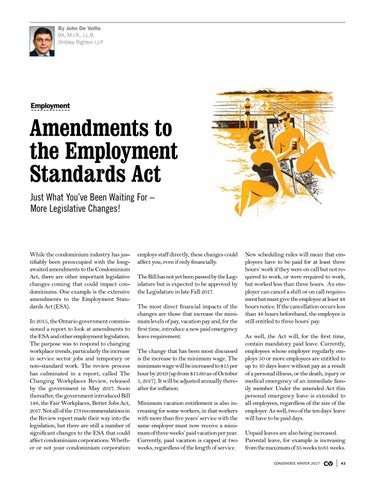By John De Vellis BA, M.I.R., LL.B. Shibley Righton LLP
Employment
Amendments to the Employment Standards Act Just What You’ve Been Waiting For – More Legislative Changes!
While the condominium industry has justifiably been preoccupied with the longawaited amendments to the Condominium Act, there are other important legislative changes coming that could impact condominiums. One example is the extensive amendments to the Employment Standards Act (ESA). In 2015, the Ontario government commissioned a report to look at amendments to the ESA and other employment legislation. The purpose was to respond to changing workplace trends, particularly the increase in service sector jobs and temporary or non-standard work. The review process has culminated in a report, called The Changing Workplaces Review, released by the government in May 2017. Soon thereafter, the government introduced Bill 148, the Fair Workplaces, Better Jobs Act, 2017. Not all of the 173 recommendations in the Review report made their way into the legislation, but there are still a number of significant changes to the ESA that could affect condominium corporations. Whether or not your condominium corporation
employs staff directly, these changes could affect you, even if only financially. The Bill has not yet been passed by the Legislature but is expected to be approved by the Legislature in late Fall 2017. The most direct financial impacts of the changes are those that increase the minimum levels of pay, vacation pay and, for the first time, introduce a new paid emergency leave requirement. The change that has been most discussed is the increase to the minimum wage. The minimum wage will be increased to $15 per hour by 2019 (up from $11.60 as of October 1, 2017). It will be adjusted annually thereafter for inflation. Minimum vacation entitlement is also increasing for some workers, in that workers with more than five years’ service with the same employer must now receive a minimum of three weeks’ paid vacation per year. Currently, paid vacation is capped at two weeks, regardless of the length of service.
New scheduling rules will mean that employees have to be paid for at least three hours’ work if they were on call but not required to work, or were required to work, but worked less than three hours. An employer can cancel a shift or on call requirement but must give the employee at least 48 hours notice. If the cancellation occurs less than 48 hours beforehand, the employee is still entitled to three hours’ pay. As well, the Act will, for the first time, contain mandatory paid leave. Currently, employees whose employer regularly employs 50 or more employees are entitled to up to 10 days leave without pay as a result of a personal illness, or the death, injury or medical emergency of an immediate family member. Under the amended Act this personal emergency leave is extended to all employees, regardless of the size of the employer. As well, two of the ten days’ leave will have to be paid days. Unpaid leaves are also being increased. Parental leave, for example is increasing from the maximum of 35 weeks to 61 weeks. CONDOVOICE WINTER 2017
CV
43
